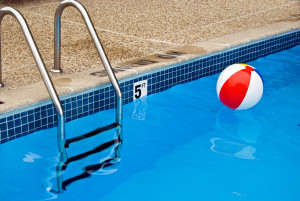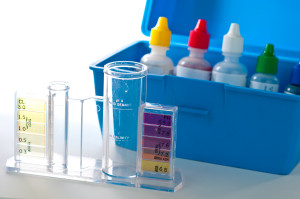Those of us in “hard water” areas of the U.S. know what’s it’s like to have gritty scale from water hardness at the bottom of a swimming pool. So the idea of filling swimming pools and hot tubs with soft water sounds fantastic.
Although there are pool owners who have successfully filled and maintained their pools with softened water, pool owners should understand that filling a pool with soft water is not simple. It involves a very delicate balance. In fact, maintaining the right levels of hardness AND softness is essential for a healthy pool.
The Fallout of Hard Water in Swimming Pools
Water described as “hard” usually has a high mineral content—generally calcium and magnesium. As more and more of these minerals dissolve in water, the mineral content levels increase, making the water harder. Excessively hard water can leave a  coating of white, gray, or brownish deposits on pool walls and floor.
coating of white, gray, or brownish deposits on pool walls and floor.
When pool water is too hard, a chelating agent can be added to render the calcium inactive and make the water “softer”. The agent actually bonds with the calcium ion, keeping it in solution and preventing it from plating out as scale (calcium carbonate).
“[Scale] is a combination of carbonate ions and calcium ions. “Hard” water can have high levels of calcium and magnesium. If these levels are too high, the water becomes saturated and will throw off excess particles (scale) out of solution which then seek to deposit themselves on almost any surface inside the pool. They can be attracted to ladders, lights and deposit themselves as very small crystalline clumps – all over the pool surfaces. Calcium Carbonate scale shows up as a “white-ish,” crystallized rough nodule.” (PoolCenter.com)
Yes, hard water can cause grief—so if you have a home water softener (and especially convenient if you’ve had a soft water exterior hose bib added) soft may seem like the obvious solutions. But hold on…
Soft Water Must be—Harder!
In the home, there are many benefits of soft water—from spot-free dishes to brighter laundry. But in a pool, some calcium hardness is a necessity.
The trouble in filling a swimming pool with softened water is that “soft water” may seek to balance itself by leeching calcium directly from pool walls—causing the pool’s plaster or tile grout to dissolve, corrode and eventually crumble. And anyone who’s had a pool replastered knows that it’s a huge expense.
“If the Calcium Hardness levels are too low, the water is under-saturated…[and] will become aggressive as it attempts to obtain the calcium it needs. Such “soft-water” will actually corrode surfaces inside the pool which contain calcium (like pool plaster) and other minerals to maintain its hardness demand.”
In addition, everything metal in the pool area such as heaters and railings can also gradually corrode from the soft water. This problem can be exacerbated if a pool owner allows the pool’s pH level to plummet and stay low for an extended period of time.
So while swimming in soft water may feel great, the soft water can greatly damage the pool.
Those who have successfully maintained pools with soft water generally increase their water hardness by adding calcium chloride or calcium chloride dehydrate found at pool supply store. Basically, all that wonderful soft water is now harder.
So, what is the right solution?
Regular Water Testing is the Key
Either way—whether you’re filling your pool with hard water or soft water—testing is essential.
Keeping water in balance is no easy task. Regular tests for pH, alkalinity and calcium hardness are essential. (The test for calcium hardness is not only the indicator of how “hard” your water is, but also how “soft” the water is).
 Many pool supply stores offer a free water sample test and analysis, and home test kits can also be purchased to evaluate these properties. Check with a local pool expert to determine what level of softness/hardness you should have in your pool. By maintaining the correct water balance, the life of the pool equipment and pool itself can be extended.
Many pool supply stores offer a free water sample test and analysis, and home test kits can also be purchased to evaluate these properties. Check with a local pool expert to determine what level of softness/hardness you should have in your pool. By maintaining the correct water balance, the life of the pool equipment and pool itself can be extended.
Keep in Mind that filling a pool from a water softener can be time consuming. Most water softeners can only fill a pool with a certain number of gallons before needing to regenerate. Check with your local water treatment expert or consult your softener manual to determine how long you can fill your pool before stopping to allow time for the softener to backwash and regenerate.
If you’re looking for a local water treatment expert, contact your local authorized WaterTech dealership to learn more about the Reionator and other outstanding WaterTech products.




11 Responses
I didn’t know that soft water would damage the tiles in your pool. My husband and I are getting a pool put in, but we’ve been wondering what kind of water and water filters we should use. Would a water supply company be able to help us decide which is best?
Not sure if you got an answer to this one but you should ask your local retailer about Baleen Filters. They work better than OEM filters, are durable enough to be rinsed and re-used, and they are the best priced filters out there. Great value and reliable…Also, ask about the Turbo Ion Exchange Pre-Filter to fill your pool with bottle quality water, that thing is AMAZING! It will help you get the most life out of your pool & spa equipment. It even works for gardening and spotless car washes! Not sure if you can get this stuff online but your local pool/spa store should have them. Especially if you are in the south or California. Best of luck!
I have been looking to get a hot tub recently, and this is one of the questions that I had. I would really like to make sure that my hot tub doesn’t have any problems because I am using soft water. It would probably be a good idea for me to talk to some professionals about the hot tub I am getting and what their advice is. Then I can work on balancing the chemicals often to be sure that it is all in good condition. Thanks for the great post!
I’m really glad that your brought up the topic about the right type of water to use in a swimming pool. My family decided to install a new pool in our yard, so we’re trying to decide whether it would be best to use soft water or hard water. I’ve always thought that filling a pool with soft water would be better, but I didn’t realize that pools need some calcium hardness. Now I can see why regulating the water in my pool to make sure that it has just the right amount of hard water is important.
So, if I understand correctly, I can use softened water as long as I can maintain the chemical level. Am I correct?
Good points. One other issue is that too much hard water can interfere with the pool’s filtration systems with buildups and etc.
I’ve filled my spa’s and pools with soft water for 30 years. It’s much easier to add cc to raise the hardness, than to try to remove the calcium from hard water. If you start soft and work it up carefully, you’ll find that maintaining the water quality is much easier. It’s also easier on the pool and equipment. In my pools, I actually lower the water level in rainy season (we get a lot of tropical rains) to take advantage of the nice soft rain water.
I’m having pool installed. Pool company insists that initial fill be from hard water source (public water) in order to set the pool sheen. Then the pool will be connected to my softened water source. Pool company insisted that initial fill be with hard water to protect the pool finish.
Yes, the pool should be filled with hard water first so that the plaster and other “sealants” have a certain amount of hardness. After the pool has been initially filled, it is then very beneficial to connect the “filler” to soft water from that point moving forward. Anytime the pool is completely drained it should be filled with hard water again but after that, connected to the filled with soft water. Following the instructions of your pool builder will ensure that your pool warranty will remain valid. Also, if your pool will have an automatic chlorine generator, your pool builder will most likely recommend to NOT connect to soft water. The reason for this is that a softener will add sodium to the water and that can upset the ability to create chlorine.
Knowing that soft water can leech calcium from the pool walls is quite surprising. I did not know that. If I were to get or build a pool, I would for sure get the water tested to ensure the calcium levels would stay where they are supposed to.
I guess I never considered how hard it would be to balance the softness and hardness of your pool water. I’ve never had to worry about it, but I always noticed public pool managers always testing the water back when I was a kid. Sometimes they wouldn’t let us into the hot tub because the water chemicals were too far off.